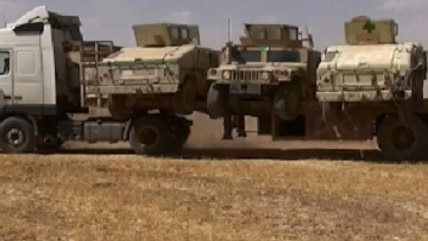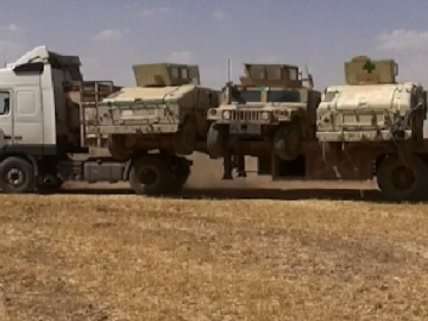Interventionism Is a Bigger Terror Threat Than the Iraqi Civil War
The beef ISIS has is with the government in Iraq, not the U.S.


One of the arguments deployed for continued U.S. involvement in Iraq is that the rise of jihadist groups like the Islamic State in Iraq and Syria (ISIS) in the region will lead to more terrorism directed at the United States. "The seeds of 9/11s are being planted all over Iraq and Syria," Sen. Lindsey Graham (R-S.C.) warned last week.
As Sen. Rand Paul (R-Ky.) noted over the weekend, the blame for the current instability in the Middle East could be placed on the disastrous Iraq War waged by the U.S. in the last decade. Indeed, U.S. interventions across the wider region have helped Al Qaeda-linked groups like ISIS set up base. Insofar as the terrorist threat to America is real, U.S. intervention to date has helped to create the conditions on the ground to incubate such a threat—suggesting more intervention as a solution is profoundly unthinking.
More importantly, the terrorist threat to America, such as it is, is only loosely connected to happenings in the Middle East. Incidents classified as terrorist attacks in the U.S. have not involved suspects tied to the collection of Al Qaeda-linked groups in the Middle East. The U.S. campaign against Al Qaeda in the Arabian Peninsula (the Yemeni affiliate), meanwhile, may have provided the basis for the Obama 2012 campaign's claim the Al Qaeda was on the run, but it has also not stopped the group from operating as a local insurgency much as Al Qaeda-linked groups elsewhere do.
The specific threat to the U.S. from ISIS is nearly non-existent. The jihadist group seeks to establish an Islamic State in Iraq and the Levant (Syria, Lebanon, Israel, Palestine, and Jordan) and through its militant actions does pose a direct threat to the sovereignty of the Iraqi and Syrian governments. Yet a group devoted to violently competing for sovereignty with governments in the region is unlikely to devote any resources on a country like the U.S., far from any territorial claims it is fighting over.
That could change if the U.S. does enter the conflict to help the Iraqi government exercise sovereignty in its territory. Such an intervention would incentivize the U.S. as a target for ISIS while simultaneously disincentiving the Iraqi and other governments from taking responsibility for regional security and devoting the resources necessary to combat ISIS. In Iraq today Secretary of State John Kerry urged Iraqi Prime Minister Nouri Al-Maliki to form a competent, inclusive government—Al-Maliki has not formed a government since winning a third term in April. Kerry's obvious observation nevertheless illustrates the need for the Iraqi government to pursue a military and political solution to the threat posed by ISIS. The Iraq War may have contributed to the chaos in the Middle East today, but Al-Maliki's own actions have also contributed to ISIS's strength, helping the jihadist group to find sympathy within a population (Sunnis in the western regions) marginalized and targeted by his government.
In talking about blame, Sen. Paul also said he didn't blame President Barack Obama for the situation in Iraq. Such blame has been levied against the president in an attempt to nudge him toward intervention. In a perhaps unsurprising display of false equivalency, for example, the pro-war commentator Bill Kristol wrote that now was "not the time to re-litigate either the decision to invade Iraq in 2003 or the decision to withdraw from it in 2011," his and his fellow-travellers' suggestion being that Obama's failure to extend the Iraq War in 2011 has contributed to the current chaos. The president looks ready to move for his critics, too. As Daniel Greenfield noted in Foreign Policy, at last week's press conference Obama completely disowned the decision to end the war in Iraq, blaming Al-Maliki for refusing to extend immunity to U.S. forces in the country. The president, when he was running for re-election, campaigned heavily on having ended the Iraq War despite actually trying to extend it, and then denied that those Republicans who advocated for a residual force in Iraq were holding the same position he held while trying to postpone the end of the war in 2011. The rhetorical turnabout could help him lay the framework for arguing for more intervention in Iraq.
It's important, then, to remember a previous turnabout by the president, on Syria. Last summer the Obama Administration was aimlessly pushing for intervention in Syria over the use of chemical weapons before acquiescing to a Russian request to try diplomacy instead sparked by an off-the-cuff remark by John Kerry. The U.S. has continued to provide military and non-military aid to "moderate" rebel groups in Syria but Al Qaeda linked groups are among the Syrian rebels too, and the civil war in Syria has certainly contributed to the strength of the ISIS campaign in Iraq, a sobering reminder of how well-intentioned but not well-thought-out U.S. interventions can create more instability that's then used to justify more intervention.


Show Comments (14)